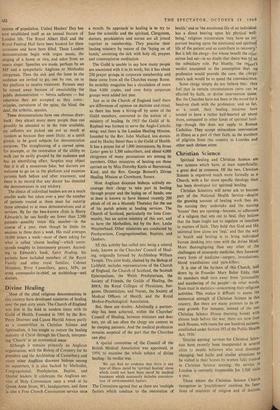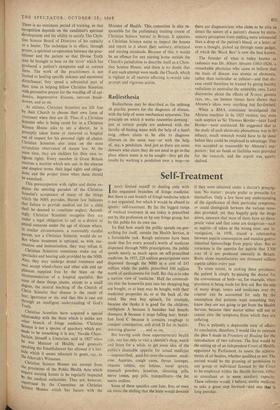A different sort of planning is required for what one
might call living-room psychodrama. By this I mean those sober plays which seek out hitherto uncharted emotional muddles and then
INVESTMENT INTEREST INCREASED TO
As from July 1st 1960, every paid-up Shareholder in our Society will receive interest at the rate of 3i% per annum. This will be worth £5.14.3d. % where income tax is pay- able at the standard rate. Money in Trustee Deposit account will earn 34% as from August 1st also with income tax paid. Investors can draw their money out easily when required without depreciation.
ASSEIS EXCEED 125,000,000 RE5001/15 EXCEED 12,000,000
CHELTENHAM
AND
GLOUCESTER
BUILDING SOCIETY
Established in 1850
MEMBER ClE THE BUILDING SOCIETIES ASSOCIATION General Manager and Sc ONII: 1054 Branch Offices: Gloucester, Hereford, Oxford, Bournemouth Thunton, Reading. set about presenting them between the three cream walls of the stage apartment. I may be wronging Jack Ronder by suspecting that he conceived This Year, Next Year in this way, but it was certainly more clear that his play was about two sisters who couldn't leave each other than why they shouldn't From his title onwards the answer had to he not sometime but never, yet it was only a series of accidents which pre- vented them from separating' at the end of the play. One expected underhand plotting by the sister who wasn't getting married, but there was no evidence of it—just as the possibility of incestuous lesbianism was left in the air as a By DAVI La Sonnambula, which opened at Covent Gar- den on Saturday with the announcement, to an aghast house, that Miss Sutherland was singing under the handicap of a heavy cold, ought to have been insufferable, deprived of its sole raison d'etre, a nightmare of mummified triviality; and I must admit that the alacrity with which we all sat up and took notice at the entry of a quartet of basset hounds in the final scene was a just measure of the dramatic interest to be found in the opera, at the very highest point of the plot. Mummified it is, even with a prima donna at full strength to throw a veil of glorious irrelevance over its inanities. The story—set, like L'Elisir d'Amore, in an Alpine village square and concerned with the jealousies and misunderstandings which delay a wedding—has almost none of the wit and local colour and credibility of character which help to pass the evening in Donizetti's work, and the sleepwalking which afflicts the heroine, though a praiseworthy variant of the usual lunacy, never becomes more than a transparent device to keep things going for three acts. But even last Saturday La Sonnambula justi- fied itself, by that priceless gift of Bellini's besides which all Donizetti's theatricality and Rossini's high spirits arc as sounding brass and a tinkling cymbal—his sad, serious, gentle, un- failing musicality. Music is only the beginning of opera, but an opera is nothing if it does not begin with music. 13ellini always does that. There is heart in his most routine roulades and a vein of sincerity running through the silliest string of thirds and sixths, not to mention his famous power of self-perpetuating melody. La Sonnanz- bula, to me, is the least impressive of his famous works (in a large theatre, at least); but it is still vastly more rewarding than Lucia. At Covent Garden it does not get the full Lucia treatment, though Serafin is again there to preside guilefully over the musical side of the proceedings; there were one or two somnam- bulistic passages in his conducting on Saturday Cani di Bassetto dangerous aroma for the audience to sniff at if it so inclined. None of this spoilt some good scenes and a superb performance by Brenda Bruce (whose only problem was to seem unattractive enough) as the spinsterly sister. But the danger with these plays—and another typical example was The Wrong Side of the Park, whose heroine should have had treatment long before John Mortimer arrived on the scene to record her troubles—is that the playwrights have to wander further and further into the fringes of everyday reality in their search for something new. Event- ually they will all meet, notebooks in hand, at the doors of our all-too-few psychiatric wards.















































 Previous page
Previous page